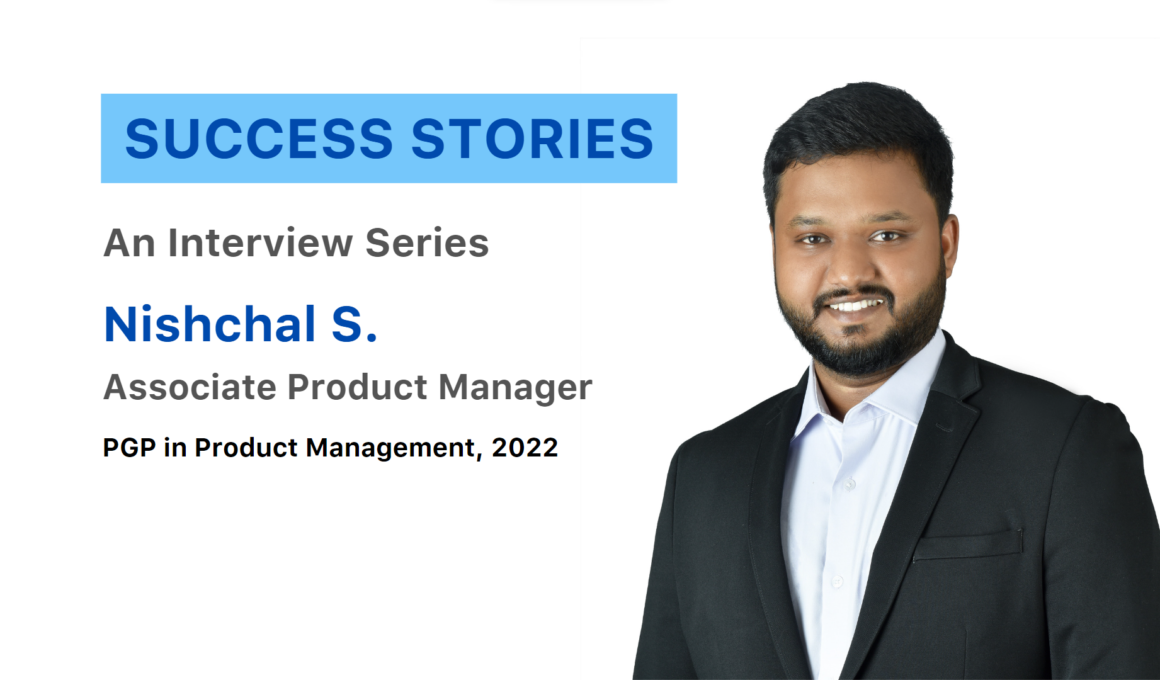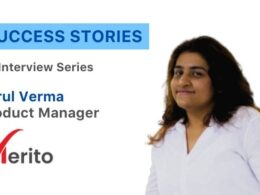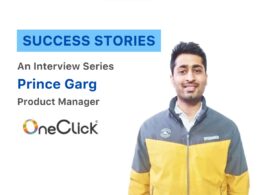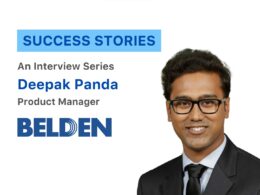In our latest addition to the Success Stories blog, we feature Nischal, who is an Associate Product Manager. He shares his story of switching from a non-technical/coding background and then moving towards new beginnings in the Product Management industry. Get to know more about him as he guides us through this amazing process.
Q1. Tell us about your current role and background.
As I’ve been previously working, I started my career in tech support. And then I moved recently, and just before this, I started working as a Customer Success Manager for Instahyre.
So it was a hiring-based platform company just like Naukri. So my background has always been towards the non tech side of it. From the technical side, I just had very little experience and called it just like learning coding and those things just for educational purposes.
And then that is when I started exploring new aspects of new things as well. And Product Management caught my eye. And so now I have transitioned my career from a Customer Success Manager to an Associate Product Manager.
It’s not the traditional type of Product Management, I would say it’s called something as Platform Product Management. It’s a bit more technical than regular product management, but not too technical as Technical Product Management.
It’s in between, but when it relates to the difficult aspects of it, it’s very difficult compared to technical product management, the things that the day-to-day activities and the things that we do.
Q2. What challenges did you face while exploring a Product Management role?
Oh, well, I recently started about three months back. And it was very overwhelming for me at the beginning stages, considering that there was so much information that I needed to process and most of it were technical aspects of it.
And yeah, so I was dealing with a lot of ambiguity also, and since I’m working with one of the MNC startups, good things are moving at a very fast pace.
So me trying to keep up with all the technical aspects in learning the platform, understanding the product and how it’s built, how it’s going to work, how the customers are using it, who our customers are, and how are we getting paid, what are the multiple fronts that a platform is able to bring in different applications, right?
Just to give you an example, we as a single platform, enable multiple products to work seamlessly through the single platform. So just to understand all these products, I was, in the general sense, as a Product Manager hired to our company, right, just a Product Manager, he or she would be working on just one product.
But as a platform product manager, we are working on all the products, we need to know the ins and outs of how everything works. So that we can give a smooth experience to the application side of things.
So that is where I find a lot of challenges. But I’ve been constantly learning and, you know, getting a lot of information from my viewers as well. That is where things have been helping also.
And the things that I learned in the past are something relatable also, especially the engineering chapter from what was taught, right, that was really helpful from Accredian.
Most of my classes were taught by Shailender. He was really amazing, he actually set the tone for me and you know how to think like a product manager rather than just a manager, or anybody from a different background.
Also, it’s more about how to think like one, as a Product Manager is where I learned from him. And that’s been really smooth. That’s been really helping.
Q3. How has Product Management helped you in your new role?
So this is what I’ve been learning a lot over the past one and a half years. But one thing that I left out is to understand that there is something interesting in Platform Product Management.
But once I started exploring these nuances of product management and how things work, that was really helpful like I said, right, the engineering chapter primarily and the first chapter how to think like a Product Management, how to go about your day as a product manager, how to work cross-functionally with the teams.
Because in my previous role, it was not that cross-functional. So we would interact with our clients, get the feedback and then share it across documentation to the team, to our product managers also in our previous company, and they will take it forward from there and if there was any necessity for us to get back to the client. We will do that along with the product manager.
But here, it was far more diverse. I had to connect with a lot of teams. I have to get them on, you know, to agree to come to a meeting. And also the one thing that Shailendra also told me is about the constant back and forth that happened with a product manager and the development team.
And luckily, so far, I haven’t experienced this, but I have seen this sort of thing happening in the corporate world, also where the disagreement between the development team or the client facing role teams to the product manager also, and how we have to get them aligned to what the business needs are.
Sometimes, when a single division is working, they’ll be looking towards getting their part of the business, right?
Rather than considering the whole aspect of the company, what is required from each and every side, that’s where the product management comes in, and trying to set everybody on the right track, which is a middle ground for both the developers and product managers or business needs and for the customer success teams to the product manager, is something of a challenge that I found.
And these are, you know, things that I learned in Accredian where Shailendar was very explanative about it. Here, a lot of examples, were really helpful, I learned those things, which I can relate to now, and make use of those as well.
This is one role where you’ll learn a lot, and you need to keep learning a lot. It’s not as overwhelming, you know, for somebody who’s scared of technology, or would say for, because I can personally relate to coming from a non-tech background, right?
That’s thinking about learning coding or something related to that, it’s not the type of learning that you would do. It’s more to do with how the business works, how to handle managing people, how to think differently and to bring different aspects and different ideas into product management.
So after becoming a product manager, I started sharing my opinions and thoughts more often than I used to do in my previous role. So yeah, just learning is a big yes. And there’s always constant learning.
Q4. What was the interview experience at your current company?
I had to go through 3 rounds of interviews, namely:
- Round-1: Technical round
- Round-2: Case study
- Round-3: Take-home Assignment
So the interview experience was actually something really great. And at the same time, it was very fast as well. So I applied, and after one week or so I got a call on a Friday. And they told me that they would like to go to the interview, and they wanted to schedule it for Monday. I had the weekend’s time to prepare.
But you know, Accredian has a feature, where we can do mock interviews, and I wanted to apply for it. But the timeframe, considering it’s a weekend and everything. I couldn’t get the mock interviews done, but I tried out the sources to prepare myself for these interviews and interviews were challenging.
See, what I would say is there is a certain set of etiquette, candidates should follow in terms of interviews, compared to any other interview. So you would be dealing with this interview in a completely different manner.
It all starts with how you would introduce yourself to the job role that you’re applying for and the interviews thereafter. Also, there are so many examples on YouTube, and even on the Accredian page also about how to ace interviews.
So I would say that it’s not something that you can jump into, and then give an interview, you will need to give a lot of interviews and mock interviews, that would be the best way to prepare yourself for such interviews.
And the interview was really challenging as well. And at the same time, it was all about taking time during the interview process. And it’s not just about you, you know, as soon as they asked the question, we went back with an answer.
Now you can take your time, you can jot down the information and say, get back to them. And if you need more time, you can let them know or sometimes you also feel scared that you’re taking too much time and what the interviewer would be thinking that way.
So in those times, you can tell them that, “Hey, I’m working on this, I need an additional 10 seconds, 30 seconds” or however long time is that just to keep the engagement on.
And yeah, so the more involved you are, rather than just don’t jump to the solution of the problems or the interview question that they ask, think about the problem first, and then the solutions will come even if you don’t live with the solutions. It’s completely fine.
Nobody would expect to give us a solution for a business problem, or whatever an interview in a matter of minutes.
If that was as simple as that, then, you know, why would businesses be so slow? Right? They will sort it out first. So it’s all about understanding the problem and taking it one step at a time.
So we had a couple of rounds of interviews. One was the first technical round and then I had a technical Round with a few questions about how to move the product for a blind person so that he or she can transit from the bus stop to his home or anywhere he needs to get by. So that was the scenario that we wanted to build a product on.
And then we had a second round, where it was more to do with the more technical understanding of the problem, giving more difficult scenarios to go with the problems and how you can. It’s all about the interviewer trying to gauge how fast you can understand the problem.
And, and how you can, you know, do follow-up questions, they start with very ambiguous statements, you need to dig in more, you need to ask questions back to them and get the answers from them. So that you are sure that you’re understanding the question, right? So that’s how things went.
And then there was a take-home assignment where we had to create a PRD. So that was again, a very helpful thing, I learned a lot of templates and how to start and write PRDs. So those PRDs, which I wrote and submitted are everything I learned from Accredian itself.
And, after I submitted the PRD, I got a final call from HR to discuss the day, that was pretty much it, there were four rounds of interviews, and everything went well. And really, it was all done in a matter of two weeks.
Q5. Why Accredian? How did it help you?
So when I wondered, when I decided to actually transition my career, there were a lot of opportunities out there, a lot of you know, platforms that were offering product management. So I actually compared a lot with other platforms also.
But one thing that caught my attention with Accredian is for you to start with that three-month package. I don’t know the entry-level program, I forgot that. So that was, you know, very economical from the beginning. I want you to give that a try for three months, because I was also pursuing my MBA during this phase.
So studying MBA, working, and I didn’t know whether I could also pursue Accredian’s Product Management. So when I spoke to the representative, they told me that there’ll be recorded sessions, which was a win-win situation for me.
And so I also started the three months program to see at the end of three months, I wanted to gauge if I can continue in this role, or something that I wanted to. That’s why I primarily chose Accredian.
And after the three months, even before the end of three months after I had a session with Shailender I was completely sold. And the way he explains things is really brilliant.
I mean, he’s a great personality to interact with also. And when he keeps talking, you just want to listen, he is that knowledgeable. And he gives you a lot of information that you can soak in and use in the future also.
And so after that session, I decided that I’m going full-fledged for this. And I’ve also extended the program to PGP. And ever since yeah, I’ve been learning. But now since I joined product management, I haven’t come back to this part of learning rate. But yeah, I’ll definitely be finishing it.
Now one major thing is that you know, as a product manager, your mindset is completely different from any other job roles that you would understand, like, as I’ve told previously, also, in this session, you will need to get into that thought process or you need to have that mindset set, right? To be a product manager.
It’s not something that you can change overnight as well. And you also need guidance for this, on how to set your mind, how to think, how to act, and how to delegate yourself as a product manager. So this is something that I really learned well in the very first chapter, and that is still stuck in my head, and it’s going really well.
Even in my current role, I’m able to relate to it and be able to apply all those things. And certain things also like from the engineering perspective, or from the UI perspective, from the customer perspective, what are the things that we need to do, and how to balance business and tech or how to balance between business and the different teams that are working on?
So thinking like a product manager is one definite first and then the technical skills that the minimum technical skills that I needed to learn in order to, you know, keep myself engaged and have a meaningful conversation with the developers and not make myself look like a fool is something that also again got here from the engineering chapters.
Q6. What advice would you give to Product Management beginners?
Also, product management is a really rewarding career and it’s really amazing. Also, the type of work that you would be doing is really good. Again, it’s not for everyone, I would say the pressure of two job roles itself can be very overwhelming.
So, do a bit of research, interact with a lot of product managers, and, you know, consider taking step-by-step guides, and learning constantly in this field. And don’t be overwhelmed when I say learning.
It’s not the educational institution’s level of learning. It’s all about learning new things, looking at what other people are doing, and what your competitors are, and keeping yourself constantly evolving as a product manager as you go.
And definitely prepare for the interviews. Interviews can be completely different from other interviews that are non-technical, or even the technical side of software developers interviews.
Preparing for interviews will be really great. And watching as many YouTube videos or educational content that you can consume related to product management that’s also goes a long way in helping to crack product management, and also smoothly in getting into it.
Apart from this, there is one book that really helped me, it’s called “Product Management Simplified-A Toolkit to Becoming a PM“. This book really helped me and it also gives you that confidence that you can crack such interviews, or you can get into this field and do better for yourself.
But yeah, for anybody who’s trying to pursue product management, I would really advise going for it. It’s a very rewarding career.
We hope you found this success story interesting. If you have any Product Management questions, please fill this form and we will get back to you.






